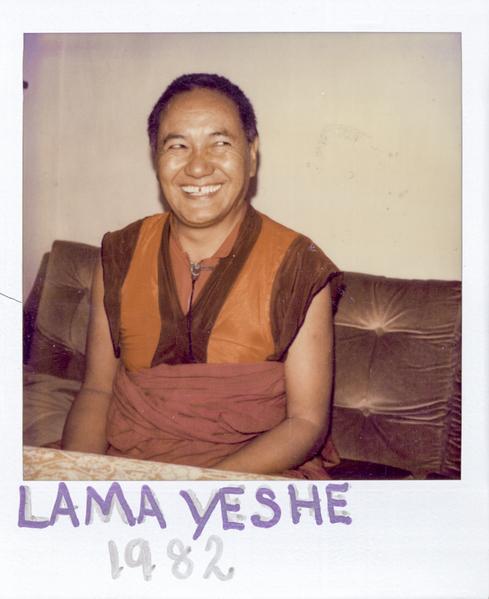Dear Friends,
Thank you for reading our monthly e-letter—we’re so glad to have you with us. Please feel free to share it!
In this issue, we’re excited to announce another new free publication now available to order on our website—our second print release of 2025! We’re on a roll, and thanks to your ongoing encouragement and support, we’re more inspired than ever to continue sharing the wisdom teachings of Lama Yeshe and Lama Zopa Rinpoche. Our goal is to be your valued Dharma resource!
We also have a range of new offerings from the Dharma archives: a new video and podcast, the latest installment of the Big Love audiobook heart project, and several newly published Big Love teaching excerpts on our website. You'll also find the November 1991 Kopan Course newly posted online, along with fresh entries in Lama Zopa Rinpoche’s Online Advice Book. Plus, this month’s featured teaching is a powerful excerpt from Clean-Clear on the eight worldly dharmas.
We feel so fortunate to be in community with you. Thank you for making it possible to share these precious resources.
Now Available: Clean-Clear
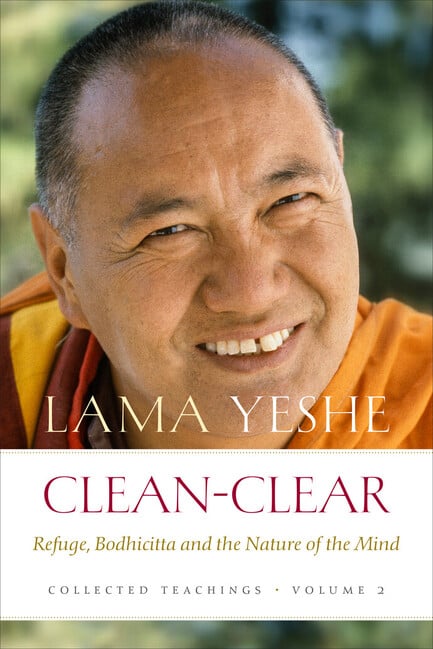 We’re excited to announce that Clean-Clear: Refuge, Bodhicitta and the Nature of the Mind is now available to order on our website, in both print and ebook formats!
We’re excited to announce that Clean-Clear: Refuge, Bodhicitta and the Nature of the Mind is now available to order on our website, in both print and ebook formats!
This is the second volume in the series of Lama Yeshe’s collected teachings, featuring introductory talks given in England (1976) and Holland (1980). In these teachings, Lama Yeshe focuses primarily on refuge and bodhicitta, and also offers a public lecture on the nature of the mind. As always, it's clean clear!
Compiled and edited by Nick Ribush, this book continues our mission of sharing Lama Yeshe’s profound wisdom with the world.
We’re able to offer these books thanks to the generosity of our members and benefactors. The special, holy merit-multiplying day of Saka Dawa is coming up on June 11, so stay tuned for more details on how you can take part in this meaningful opportunity.
From the Video Archive: Expanding Your Practice of Compassion
This month from the video archive, Lama Zopa Rinpoche explains how we can use our personal experience of sickness and death to expand our compassion and give meaning to our lives. These teachings were held at Swedenborg Chapel in Cambridge, Massachusetts, in November 1998 and hosted by FPMT's Kurukulla Center.
Visit and subscribe to the LYWA YouTube channel to explore our complete video collection of teachings by Lama Yeshe and many from Lama Zopa Rinpoche, available from our archive. See the FPMT YouTube channel and the Rinpoche Available Now page on the FPMT website for many more videos of Lama Zopa Rinpoche’s teachings.
On the LYWA Podcast: The Meaning of Om Mani Padme Hum
MANI signifies the truth for all-obscuring mind, the dependent arising, and PADME is the truth for the absolute wisdom, the emptiness. Then HUM is the unification of dependent arising and emptiness.
—Lama Zopa Rinpoche
This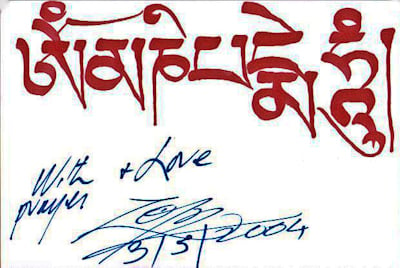 month on the Lama Yeshe Wisdom Archive podcast, Lama Zopa Rinpoche explains the multi-leveled meaning of the mantra, OM MANI PADME HUM, and then offers an oral transmission of the Long Chenrezig Mantra. These teachings were given in Singapore in January 1993. You can read along with the transcript on our website.
month on the Lama Yeshe Wisdom Archive podcast, Lama Zopa Rinpoche explains the multi-leveled meaning of the mantra, OM MANI PADME HUM, and then offers an oral transmission of the Long Chenrezig Mantra. These teachings were given in Singapore in January 1993. You can read along with the transcript on our website.
The LYWA podcast contains hundreds of hours of audio, each with links to the accompanying lightly edited transcripts. See the LYWA podcast page to search or browse the entire collection by topic or date, and for easy instructions on how to subscribe.
The BIG LOVE AUDIOBOOK HEART PROJECT
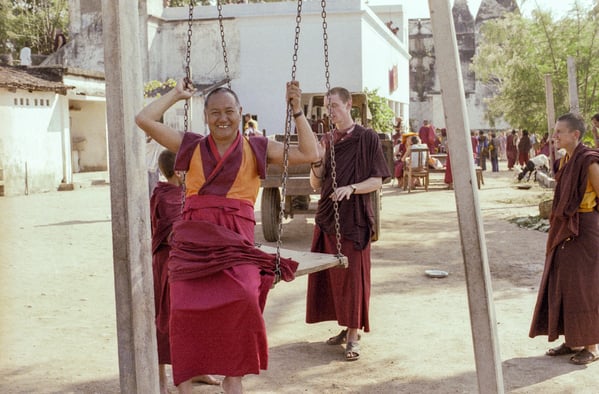 We are happy to share the latest audiobook installment of Big Love: The Life and Teachings of Lama Yeshe, written by Adele Hulse. Organized by Janet Brooke, this heart project comprises narrations recorded by personal friends of the late Åge Delbanco (Babaji), one of Lama Yeshe's earliest students. This is a unique opportunity to hear this extraordinary account of Lama Yeshe’s life read by those who were there as the story unfolded—especially valuable if you don’t have a copy.
We are happy to share the latest audiobook installment of Big Love: The Life and Teachings of Lama Yeshe, written by Adele Hulse. Organized by Janet Brooke, this heart project comprises narrations recorded by personal friends of the late Åge Delbanco (Babaji), one of Lama Yeshe's earliest students. This is a unique opportunity to hear this extraordinary account of Lama Yeshe’s life read by those who were there as the story unfolded—especially valuable if you don’t have a copy.
This month the Big Love Heart Project brings you Chapter 20: 1982: A Celebration of the Enlightened Experience narrated by Lennie Kronish, Barbara and Francesca Hampton. Chapter 20 shares stories of events including the First Enlightened Experience (EEC1), Lama Yeshe's trip to China and Tibet, His Holiness the Dalai Lama's European tour, Lama's teachings on the Six Yogas of Naropa and stories about Christmas in Italy.
Read on to find Big Love teaching excerpts newly published on our website.
What's New On Our Website
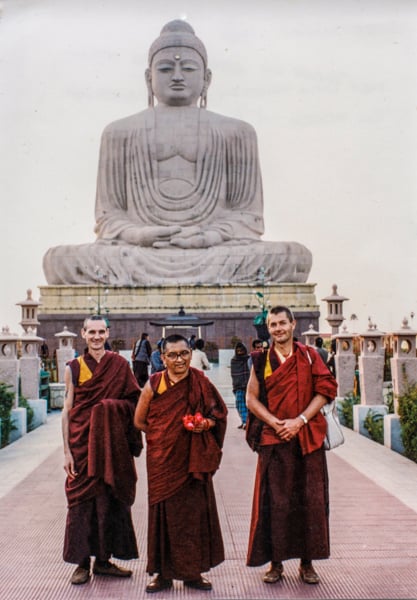 This month we’ve added two teaching excerpts from Big Love: The Life and Teachings of Lama Yeshe. In Recognizing Vajrapani, Lama Yeshe explores the profound benefits of Vajrapani guru yoga and shows how we can transform the projections of the dualistic mind into peace, bliss and joy. In the second excerpt, Living in Awareness, Lama Yeshe emphasizes the importance of mindfulness in all our actions throughout the day.
This month we’ve added two teaching excerpts from Big Love: The Life and Teachings of Lama Yeshe. In Recognizing Vajrapani, Lama Yeshe explores the profound benefits of Vajrapani guru yoga and shows how we can transform the projections of the dualistic mind into peace, bliss and joy. In the second excerpt, Living in Awareness, Lama Yeshe emphasizes the importance of mindfulness in all our actions throughout the day.
Visit our new Big Love Teaching Excerpts webpage where you’ll find a growing selection of teachings featured in the book. The excerpts are organized by chapter, with easy navigation links. Be sure to check back often, as we’ll continue adding new content each month!
We’ve also posted online Lama Zopa Rinpoche’s teachings from the 24th Kopan Course in November 1991. The lightly edited lectures present the path to enlightenment in Rinpoche’s unique, spontaneous and intimate teaching style. The 24th Kopan Course is also available as a four-part ebook series. Visit our Kopan eBook Series webpage to find links and short descriptions for each title, lightly edited by Gordon McDougall. You can also read many more Kopan courses online or download as free PDF files.
Don't miss out on the new entries to Lama Zopa Rinpoche’s Online Advice Book we've added this month. Each year, we include over 100 new pieces of advice on various topics, bringing the total to more than 2,600 entries now available on our website.
- The Incredible Benefits of Chenrezig Mantra: Rinpoche advised that the OM MANI PADME HUM mantra is unbelievably powerful, especially if we recite it with bodhicitta.
- Experience the Suffering for Others: In this long letter, Rinpoche advised how to transform problems into happiness and cited the example of Milarepa, who purified extremely heavy negative karma to become enlightened in one lifetime.
- Depression, Suicidal Thoughts and Constant Pain: A student wrote that her daughter had long struggled with addiction and depression, as well as poor physical health, and she repeatedly spoke of wanting to die. Rinpoche sent this advice.
You can always find a list of all the newly posted advices from Lama Zopa Rinpoche on our website.
Support for Translations & More Dharma Resources
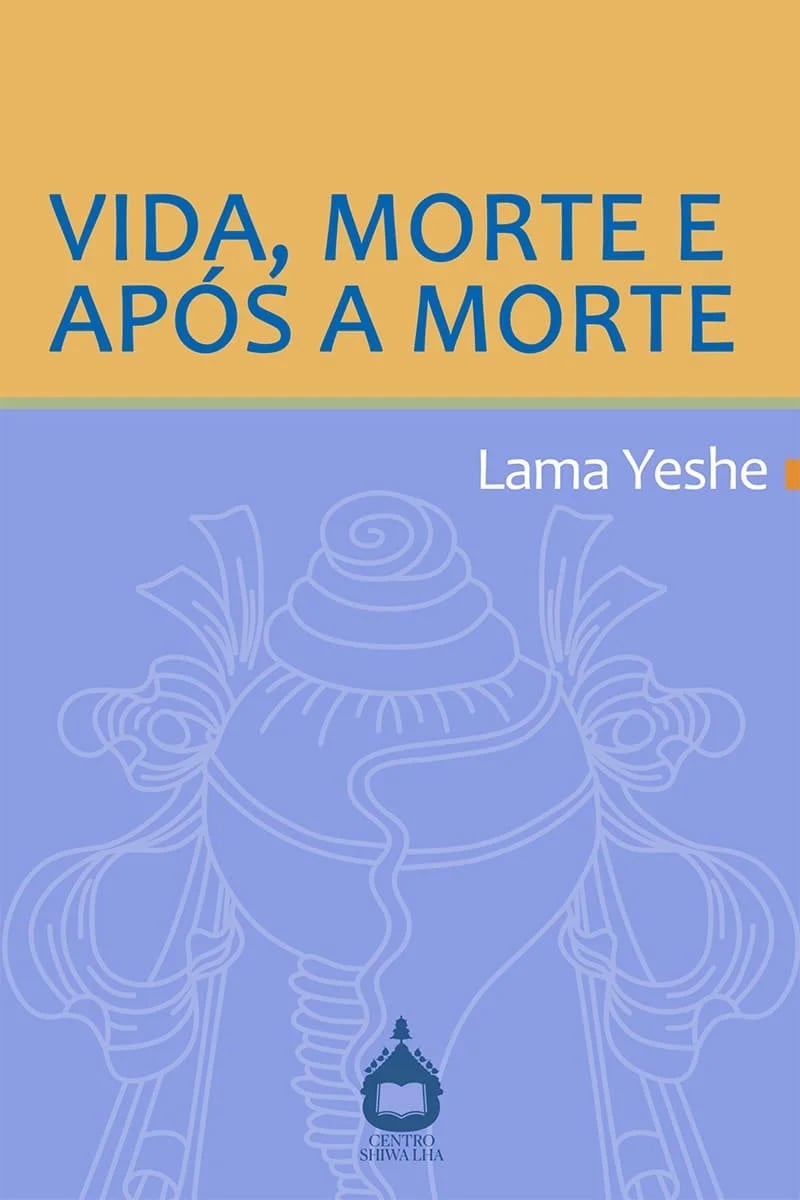 We’re pleased to announce the release of a new Brazilian Portuguese translation of Life, Death and After Death by Lama Yeshe. This edition was published by the Translators Group at Centro Shiwa Lha, the FPMT center in Rio de Janeiro, Brazil. You can download the free PDF.
We’re pleased to announce the release of a new Brazilian Portuguese translation of Life, Death and After Death by Lama Yeshe. This edition was published by the Translators Group at Centro Shiwa Lha, the FPMT center in Rio de Janeiro, Brazil. You can download the free PDF.
LYWA partners with publishers around the world to make our publications available in multiple languages. We invite FPMT centers to collaborate with us on translating LYWA books into local languages—no foreign rights or royalty fees are required. If you’re interested in learning more about how we can support your translation efforts, please contact us. Currently, LYWA titles have been translated from English into 19 different languages. Visit our website to learn more!
You may also feel called to explore Wisdom Publications’ new online course with Ven. Robina Courtin, teaching on Lama Yeshe’s transformative Mahamudra teachings. The course begins on July 11, and you can save $50 by enrolling before June 1.
As always, thanks for all your love and support, and don't miss out on reading an excerpt from Clean-Clear below.
Big love,

Nick Ribush
Director and the LYWA team
THIS MONTH'S TEACHING: The Bane of the Eight Worldly Dharmas
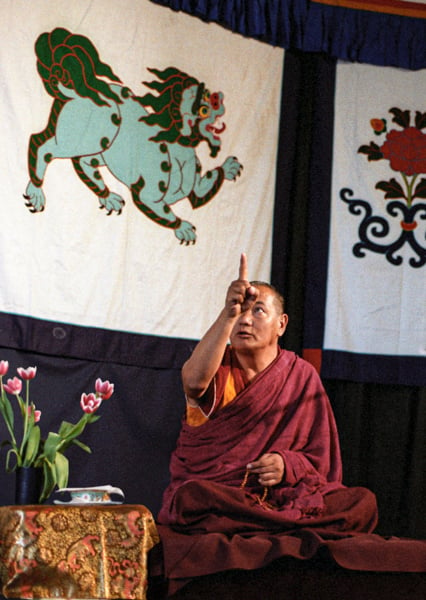 The root of the eight worldly dharmas is ignorance. This worldly attitude is a symptom of ignorance, of not seeing reality, and is the main human problem. Furthermore, it is not just our problem—it’s universal living beings’ problem, those who have not reached beyond ignorance. It’s not only Eastern people’s problem or Western people’s problem. It’s all universal sentient beings’ problem. In order to solve this problem, we have to gain wisdom and see things clean clear. That’s why we take refuge in the clean-clear wisdom of Dharma.
The root of the eight worldly dharmas is ignorance. This worldly attitude is a symptom of ignorance, of not seeing reality, and is the main human problem. Furthermore, it is not just our problem—it’s universal living beings’ problem, those who have not reached beyond ignorance. It’s not only Eastern people’s problem or Western people’s problem. It’s all universal sentient beings’ problem. In order to solve this problem, we have to gain wisdom and see things clean clear. That’s why we take refuge in the clean-clear wisdom of Dharma.
Remember how it works? Attitude, or motivation, arises from fundamental ignorance. Physical, verbal and mental actions then spring from this ignorant motivation and, as if it were some kind of manufacturing process, these actions leave negative imprints on our consciousness. Thus our ego, grasping mind, attachment and hatred all help produce the resulting symptoms. If we understand how our samsaric trip evolves in this way, the evolution of our very being, we’ll be able to generate the great energy and enthusiasm we need to take refuge in the Dharma in order to break down this beginningless cycle of existence.
In other words, if we’re aware, we’ll see that all the functions of our body, speech and mind have an energy force behind them. They don’t manifest instantly out of nowhere, as if they were not dependent phenomena. All the energy of our body, speech and mind is interdependent, linked with the energy force of our previous experiences. So every human being, each of us, is responsible for our own actions, and therefore for our own goodness or badness. We ourselves are responsible; we can’t say, “Buddha, you are responsible; Dharma, you are responsible for me.” From the Buddhist point of view, that’s a wrong attitude. I’m responsible for my own actions. My goodness and badness derive from my mind, my motivation. You people cannot make me good; you people cannot make me bad. My goodness and badness manifest from my own consciousness.
When somebody calls you a bad person and you feel it in your heart, it’s not something that came from nowhere. There’s a fundamental foundation, and that situation has arisen slowly, gradually, the way a cloud forms. The basis of a cloud forming is the energy of the sun, and when the other necessary elements are in place, a cloud is produced. The feeling is just like that; it does have an evolution. It’s the same with hatred and desire. Desire has a long history that goes back way beyond this life. It has evolved over many previous lives. If we understand that, we’ll have patience when trying to deal with it.
Frequently, the Western response to problems is impatience. That’s no good. We have to accept that problems evolve over a long period of time, and we need time and space to understand and work through them. Solving the problem of ego, for example, is a big job. We have to do it slowly, slowly, with patience. We have to understand this and not think that the problem can be solved by one quick meditation. Westerners would like things to be that way but that’s a misunderstanding. Some people might tell you that’s the way it works because that’s what you want to hear, but that’s a misconception too.
So now, the main point is to recognize that we’re not the only ones with problems. All other living beings have the same problems we do, so we should generate much compassion for them. Traditionally, when we meditate we should visualize our father to our right, our mother to our left, our worst enemy—the person who irritates us the most—in front, our dearest friend behind us, and all other universal sentient beings surrounding us on all sides. Psychologically, this is very important; it’s not just some kind of Tibetan custom. Most of the time we wouldn’t want to put our dear friend behind us where we can’t see them; we want our friend in front and our enemy in back, out of sight. So, in meditation, we put our enemy in front, our dear friend, the object that we grasp, behind us, all sentient beings around us and we generate a feeling of equilibrium, or equanimity, toward them all. In this way our mind becomes neutral and we avoid the extreme feelings that make us sick. That’s the Mahayana way of taking refuge. Instead of being concerned for only ourself, me, thinking my ego’s problems are the greatest of all and wanting to get rid of them—which is simply adding another problem to the ones we already have—we see all universal living beings’ need for refuge and take refuge for their sake.
It doesn’t matter what your situation is. You might be upper class, be the president of a country, have a great reputation, have a famous name, whatever—as long as you’re under the control of that symptom of ignorance, the eight worldly dharmas, you’re equal with everybody else: confused and suffering. It doesn’t matter if you’re beautiful or handsome, proud of your fantastic pleasures and the good time you always have, wealthy or poor, black or white, Dutch or Tibetan, your situation is the same as everybody else’s. It’s very important to recognize your equality with others because that knowledge allows you to eliminate your dualistic ambitions.
For example, Tibetan monks come to Amsterdam and survey the situation—nice cars, expensive shops, all the goodness of a modern Western city—and get very attracted to all that. They think, “I’m wasting my time in the mountains. Look at how incredibly these Dutch people enjoy their lives. They have everything. They’re the happiest people in the world!” It’s possible they can delude themselves like that. That’s what I mean by dualistic ambition. People confuse themselves like that.
But if we have a deeper understanding of the Dutch situation—that whether people are upper class or lower, enjoy nightclubs or whatever all these different people’s trips are, they’re all due to the functioning of the eight worldly dharmas that arise from ignorance and ego—our ambitions will be curtailed. Well, I hope so, but I’m not sure.
Anyway, Tibetan monks who come to Holland carrying a heavy load of eight worldly dharmas become prisoners of their ignorance and ego, even if they become Dutch citizens. Holland becomes their prison rather than the pleasurable paradise they expected. And it’s the same for native-born Dutch people. Holland is their prison, too.
Being human is both beautiful and precious. Humans have the ability to understand all universal living beings’ situations. That’s why our lives are precious. We might have problems, but we have many good qualities as well. We can understand our problems and thus eliminate them. As long as we engage in right livelihood, our lives are most worthwhile.
Excerpted from the chapter on defeating the eight worldly dharmas in Lama Yeshe’s Clean-Clear: Refuge, Bodhicitta and the Nature of the Mind, now available from LYWA. Edited by Nicholas Ribush.
























